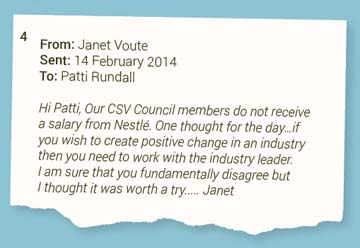Research, transparency and conflicts of interest
Is transparency a sufficient safeguard against bias? We have asked the Lancet to review the effectiveness of its conflicts of interest policy, given that two lead authors of its series on Maternal and Child Nutrition, published in June 2013, declared that they are members of Nestlé’s Creating Shared Value Advisory Committee. Such advisory roles could, depending on the circumstance, result in exclusion from European Food Safety Authority (EFSA) working groups.
Here is an email correspondence with Janet Voute, Nestlé's Vice President, Global Head of Public Affairs, asking about the financial remuneration made to CSV Committee members. We have since written to Nestlé’s CEO to see if he will answer our simple question.




The Lancet Child Survival series has an important influence on health policies. In 2003 it concluded that breastfeeding topped the list of interventions to prevent under-5 deaths. While the 2013 Series still recognises breastfeeding's importance, there is now much more emphasis on micronutrient-based foods and supplements. 8 of the 10 recommended intervention packages involve products of some kind. The private sector is also called on to generate 'evidence about the positive and negative effects of private sector and market-led approaches to nutrition.'
In November, Richard Horton, the Editor of the Lancet, Tweeted the following questions:
Can anyone out there give me evidence about Nestlé’s negative influences in health? Opinions are strong, and that’s fine, but I need facts.... the power of big food: a few corporate conglomerates shape the way you live your life. How do we resist?
Among those who responded was Prof Anthony Costello who asked:
Maybe one way to resist big food is not to have members of Nestlé’s advisory board directing the Lancet Nutrition Series.






